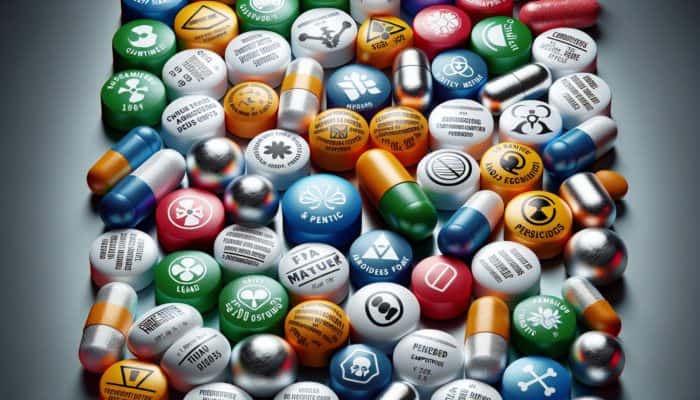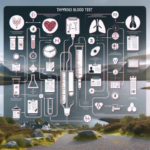Recognize and Mitigate the Dangers of Contamination in Dietary Supplements
It is imperative to understand the dangers associated with contamination in dietary supplements for anyone aiming to enhance their health through nutritional supplements. Despite their ability to significantly boost overall wellness, these products can harbor various risks that are frequently overlooked. By being knowledgeable about these health hazards, consumers can empower themselves to make informed decisions, leading to safer and more effective use of dietary aids and nutritional products. This proactive mindset is essential for not only ensuring personal well-being but also maximizing the potential benefits of supplementation.
Explore the Diverse Types of Contaminants Present in Supplements

Contaminants found in dietary supplements can emerge from numerous sources, with varying categories that pose distinct threats. Among the most concerning are heavy metals such as lead, mercury, and arsenic. These hazardous elements can build up in the body over time, resulting in serious health complications that often go unnoticed until considerable harm has occurred. Additionally, pesticides are frequent contaminants in plant-based supplements, as these chemicals are widely used in agriculture, leaving behind residues that can harm consumer health, potentially leading to long-term health issues.
Furthermore, microbial contaminants such as bacteria and fungi pose significant health threats. Inadequate manufacturing practices or insufficient quality control can foster the growth of these microorganisms, creating substantial risks for consumers. Additionally, cross-contamination during the manufacturing process can introduce allergens and other unwanted substances into supplements. By developing a thorough understanding of these various contaminants, consumers can take proactive measures to ensure the purity and safety of their chosen supplements, ultimately resulting in improved health outcomes.
Understand the Serious Health Implications of Using Contaminated Supplements
The health implications linked to contaminated supplements are serious and should never be taken lightly. Exposure to heavy metals can lead to severe health issues, including neurological disorders, kidney damage, and an array of other complications that can significantly impact quality of life. For instance, lead contamination is associated with cognitive deficits, particularly in children, while mercury exposure can lead to profound neurological impairments and developmental challenges that may last a lifetime.
In addition to heavy metals, pesticide residues can disrupt hormonal balance, resulting in various health problems, including reproductive and developmental issues. These contaminants may exacerbate allergies and sensitivities, making them particularly concerning for individuals with pre-existing health conditions. Being well-informed about these risks is crucial for consumers who prioritize their health and well-being, enabling them to make choices that protect their interests and foster better health outcomes.
Identify Various Sources of Contamination in the Supplement Production Process
Identifying the various sources of contamination is a vital step in preventing supplement contamination. The practices adopted during the manufacturing process play a significant role in determining the likelihood of contaminants being present in supplements. Facilities that fail to adhere to strict quality control standards are more prone to contamination. Additionally, sourcing ingredients from regions with lax agricultural regulations can introduce various risks, including the incorporation of harmful substances into the supply chain.
Moreover, the conditions in which supplements are stored significantly influence contamination risks. Supplements kept in excessively humid or warm environments can deteriorate, making them more susceptible to contamination. Inadequate handling throughout the supply chain can exacerbate these issues, potentially introducing unwanted substances before the products reach consumers. Awareness of these factors empowers consumers to make safer choices regarding their supplements, ensuring they select products that comply with high safety standards.
Implement Effective Strategies to Minimize Contamination in Supplements

Adopting comprehensive prevention strategies is crucial for maintaining the integrity and safety of supplements. Manufacturers should implement rigorous quality control measures throughout the production process, from ingredient sourcing to final packaging. This includes regular cleaning and sanitization of equipment and facilities to prevent cross-contamination that could jeopardize product safety and consumer health.
Additionally, ensuring proper storage conditions is equally critical. Supplements should be kept in cool, dry locations away from direct sunlight to avert degradation and contamination. Consumers can actively contribute to safety by utilizing airtight containers to minimize exposure to moisture and air. By incorporating these preventive measures, the risk of contamination can be significantly reduced, ultimately enhancing the overall safety and efficacy of supplements.
Understand the Value of Third-Party Testing and Certification for Safe Supplements
Third-party testing and certifications are fundamental components in the pursuit of safe supplements. Brands that undergo independent testing for contaminants provide an added layer of assurance to consumers regarding product safety and reliability. Certifications from reputable organizations signify that a product has met stringent safety and quality standards, which is crucial for fostering consumer confidence in the products they choose.
Recognizing the significance of these tests enables consumers to make informed choices. Look for certifications from acknowledged organizations such as NSF International, US Pharmacopeia, or ConsumerLab, which indicate a commitment to product safety and quality assurance. These steps are essential for anyone serious about preventing supplement contamination and ensuring that the supplements they consume are safe, effective, and beneficial for their health.
Select Dependable and Reputable Supplement Brands for Maximum Safety
Choosing a trustworthy brand is a vital step in the journey to prevent supplement contamination. A brand’s reputation can reveal much about the quality and safety of its products. Conducting thorough research can help consumers avoid potential health risks associated with poorly manufactured supplements, ensuring that they make choices that enhance their health.
Perform Comprehensive Research on Brand Reputation and Quality Standards

When selecting a supplement brand, understanding its reputation is essential. Start by investigating the brand’s history, core values, and commitment to quality through reliable online resources. Reputable brands typically display their dedication to transparency by providing detailed insights into their manufacturing processes and ingredient sourcing practices.
For instance, brands that openly share their third-party testing results or certifications tend to be more trustworthy. Opt for brands with a long-standing presence in the industry, as longevity often correlates with experience and reliability. Engaging with online communities or health and wellness forums can also yield valuable feedback from other consumers regarding brand reputation, further guiding your choices.
Confirm Certifications to Guarantee Supplement Quality
Certifications play a pivotal role in verifying the safety and quality of supplements. Look for labels indicating that a product has undergone independent testing for contaminants and adheres to established safety standards. Certifications from reputable organizations, such as NSF or the Non-GMO Project Verified label, can provide peace of mind, confirming that the supplement meets rigorous guidelines for safety and efficacy.
These certifications act as benchmarks for quality, ensuring that consumers are not exposed to harmful ingredients or contaminants. By prioritizing brands that boast these endorsements, you actively take steps to prevent supplement contamination and guarantee that your health regimen is based on safe and reliable products that support your wellness journey.
Analyze Customer Reviews and Testimonials for Insights into Brand Trustworthiness
Customer feedback can be a valuable source of information regarding the reliability of a supplement brand. Reading reviews and testimonials allows you to gauge the experiences of others who have tried the products. Look for recurring themes in the feedback; consistent praise or complaints can provide critical insights into the brand’s quality and efficacy, informing your purchasing decisions.
Check multiple platforms for reviews, as various users may offer diverse perspectives. Engaging with users in health forums or social media groups can also provide real-time insights into the brand’s reputation. By conducting thorough due diligence, you can protect yourself and ensure that the supplements you select are trustworthy, effective, and aligned with your health goals.
Prioritize High-Quality Ingredients in Your Dietary Supplements
The quality of ingredients in supplements is essential for their safety and effectiveness. Selecting products with high-quality ingredients is crucial for anyone looking to enhance their health through supplementation. Transparency regarding ingredient sourcing and purity is vital in minimizing the risks associated with contamination, thereby maximizing the benefits of supplementation.
Seek Transparency in Ingredient Sourcing for Better Decision-Making
Transparency in ingredient sourcing is a hallmark of reputable supplement brands. Consumers should look for brands that disclose the origin of their ingredients and the methods used in their processing. Some brands take pride in sourcing raw materials from trusted suppliers who adhere to strict quality standards, guaranteeing that the ingredients are safe and effective.
Understanding the origins of ingredients can aid in avoiding products that may be contaminated or of low quality. Brands that provide comprehensive information about their ingredient origins, including any certifications for organic or non-GMO status, can offer additional reassurance. This level of transparency is crucial in preventing supplement contamination, ensuring that you are fully aware of what you are putting into your body and its potential effects on your health.
Focus on Ingredient Purity to Maximize Safety
Ensuring ingredient purity is another critical factor when selecting supplements. Quality brands will conduct purity tests to confirm that their ingredients are devoid of contaminants. Look for products that explicitly state they have undergone testing for heavy metals, pesticides, and other common contaminants that may pose health risks.
Brands that provide Certificates of Analysis (COAs) can further assure consumers of ingredient purity. These documents outline the testing results for individual batches, allowing consumers to verify that the supplements meet safety standards. By prioritizing purity, you can significantly reduce the risk of contamination and enhance your overall health and wellness journey.
Choose Non-GMO and Organic Supplements for Enhanced Safety
Selecting non-GMO and organic supplements can help mitigate the risks associated with contamination from synthetic pesticides and genetically modified organisms. Organic supplements are produced without harmful chemicals or artificial additives, promoting a cleaner and safer product overall.
Non-GMO certifications indicate that the ingredients have not been genetically engineered, which can be beneficial for consumers concerned about the potential long-term health effects of genetically modified organisms (GMOs). By choosing these types of supplements, you align your health choices with a commitment to purity and sustainability, which are essential aspects of preventing supplement contamination and ensuring the safety of your health regimen.
Implement Proper Storage and Handling of Supplements for Maximum Effectiveness
Proper storage and handling of supplements are critical components in preserving their quality and safety. Even the highest-quality supplements can become contaminated or lose their effectiveness if not stored correctly. Taking the necessary time to understand how to store your supplements appropriately can enhance their longevity and effectiveness, ensuring you receive the full benefits of your chosen products.
Maintain Temperature Control for Optimal Stability of Supplements
Temperature significantly impacts the stability of supplements. Ideally, supplements should be stored in a cool, dry place away from direct sunlight and extreme temperatures. High heat can lead to the degradation of ingredients, rendering them less effective or even harmful to health.
Consider storing supplements in a temperature-controlled environment, such as a pantry or cabinet that is not frequently exposed to the fluctuating temperatures of kitchens or bathrooms. This simple yet effective step can significantly reduce the risk of contamination and degradation, ensuring that your supplements remain safe and effective for an extended duration.
Ensure Sealing and Packaging Integrity for Long-Lasting Quality
The packaging of supplements is equally crucial for preserving their integrity and preventing contamination. Properly sealed containers protect supplements from moisture, air, and light, all of which can contribute to degradation and loss of potency. Always ensure that the container is tightly closed after each use to minimize exposure to these damaging elements.
When selecting supplements, look for products that come in dark or opaque containers, as these can provide added protection from light exposure. Adhering to the packaging instructions is also vital; some products may require refrigeration or special handling to maintain their quality. By paying attention to packaging details, you can help ensure the safety and effectiveness of your supplements, ultimately supporting your health goals.
Monitor Expiration Dates for Supplement Safety and Effectiveness
Expiration dates serve as a critical guideline for supplement safety. Consuming outdated supplements can lead to diminished effectiveness or, worse, potential health hazards that could compromise well-being. Always check expiration dates before purchasing and consuming supplements to ensure that you are using products that remain safe and effective.
Be particularly mindful of how you store supplements once they are opened, as some may have a shorter shelf life after exposure to air or moisture. Regularly checking your supplement supply and disposing of any expired products is essential to ensure you are only consuming safe and effective products that positively contribute to your health.
Prioritize Regular Testing and Monitoring of Supplements for Consumer Safety
Regular testing and monitoring are essential for ensuring the safety and quality of supplements. Brands that prioritize ongoing testing demonstrate a clear commitment to consumer health and product integrity. By understanding the importance of these practices, consumers can make informed choices regarding the supplements they consume, thereby reducing risks associated with contamination.
Emphasize the Importance of Batch Testing for Consistent Quality
Batch testing is a crucial component of ensuring supplement safety and quality. Brands that conduct regular batch testing can identify potential contaminants before products reach consumers, preventing health risks associated with contaminated supplements. This proactive approach helps maintain consistent quality across different production runs, which is vital for consumer safety.
When researching brands, inquire about their testing protocols and how frequently they conduct these tests. Brands that prioritize batch testing are more likely to have stringent quality control processes in place, ensuring that consumers receive safe and effective products. This commitment to safety is essential for anyone serious about preventing supplement contamination and maintaining their health.
Seek Access to Independent Lab Results for Verification of Safety
Independent lab results provide third-party verification of a supplement’s safety and quality. These tests can confirm that products are free from harmful contaminants and meet established safety standards, giving consumers peace of mind regarding their health choices. Seek brands that offer access to independent lab results, allowing you to review the testing outcomes and assess the reliability of a supplement.
Understanding these results can help you evaluate the integrity of a supplement brand. Consumers who are well-informed about the testing procedures and outcomes are better equipped to make safe choices regarding their supplements, thereby reducing the risks of contamination and enhancing overall health and well-being.
Engage in Ongoing Quality Assurance Practices for Enhanced Safety
Ongoing quality assurance programs are crucial for brands seeking to uphold high safety standards. These programs typically include regular audits, employee training, and strict adherence to good manufacturing practices. Brands that focus on continuous improvement are more likely to produce safe and effective products that align with consumer needs.
Look for brands that openly communicate their commitment to quality assurance and continuous enhancement. This dedication can significantly impact your ability to ensure that the supplements you choose are safe and effective, thereby aligning with your goal of preventing supplement contamination and promoting your overall health.
Participate in Routine Audits for Consistent Quality Management
Routine audits are integral to maintaining quality standards in supplement manufacturing. These evaluations help identify areas for improvement in testing and monitoring processes, ensuring that products remain safe and effective. Brands that implement regular audits demonstrate their commitment to transparency and product safety, offering consumers additional confidence in their choices.
Consumers should inquire about a brand’s auditing practices and whether it utilizes external auditors to review their processes. This level of scrutiny helps ensure that products are consistently safe and of high quality. By opting for brands that prioritize routine audits, you can enhance your experience and ensure the safety of your supplements, ultimately supporting your health objectives.
Master the Essentials of Reading Supplement Labels for Informed Choices
Being knowledgeable about reading supplement labels is an essential skill for consumers. Understanding the details presented on the label empowers you to make informed decisions, ensuring you choose supplements that are both safe and effective. By familiarizing yourself with label reading, you can significantly reduce the risks associated with contamination and enhance your overall health.
Develop a Strong Understanding of Ingredients Listed on Labels
Deciphering ingredients on supplement labels can be challenging, but it is crucial for ensuring safety and efficacy. Pay close attention to both the active and inactive ingredients listed, as they can significantly impact health. Understanding the purpose of each ingredient can help you identify potential allergens or contaminants that could adversely affect your well-being.
Look for ingredients that you recognize and trust, as these are often more reliable. If you encounter unfamiliar terms, take the time to research their meanings and implications. Understanding the ingredients not only helps you avoid potential allergens or harmful substances but also aids in making choices that align with your health goals and dietary preferences.
Scrutinize Allergen Information on Labels for Safety
Allergen information is a critical aspect of reading supplement labels. Many products contain common allergens, such as dairy, soy, or gluten, which can trigger adverse reactions in individuals with sensitivities. Always check for allergen warnings to avoid potential contamination with allergens that could harm your health.
Some brands are more transparent than others when listing potential allergens. If you have specific dietary restrictions or allergies, select brands that clearly label their products to facilitate safe decision-making. This diligence is a key component of preventing supplement contamination, ensuring that your supplement regimen aligns with your health needs and preferences.
Ensure Label Accuracy for Safe Supplement Choices
Label accuracy is fundamental for consumers seeking safe supplements. Labels should accurately reflect the contents and purity of the supplements. Unfortunately, discrepancies can occur, leading to unexpected health risks and undermining consumer trust.
Before purchasing, investigate the brand’s commitment to label accuracy. Look for brands that are transparent about their ingredient sourcing and provide third-party testing results to support their claims. This level of transparency can enhance consumer confidence and help ensure that the products you choose align with your health goals and safety requirements.
Consult Healthcare Professionals for Safe and Effective Supplement Use
Consulting with healthcare professionals is a vital step in ensuring the safe use of supplements. Professionals can offer personalized advice and recommendations tailored to your unique health needs and goals. Engaging with a healthcare provider can significantly enhance your understanding of supplements and their potential impact on your overall health and wellness.
Receive Tailored Recommendations from Qualified Professionals
Seeking guidance from healthcare professionals can help you navigate the complex world of dietary supplements effectively. Doctors, nutritionists, and dietitians can provide personalized recommendations tailored to your health status and specific needs. Their expertise can guide you toward reputable brands and safe products that align with your wellness goals.
When discussing supplements, be candid about your health goals and any pre-existing conditions. This information enables professionals to provide informed suggestions that support your overall health strategy, thereby enhancing your wellness journey and promoting better outcomes.
Communicate Personal Health Considerations Clearly
Discussing your specific health needs and risks with a healthcare provider is essential for safe supplement use. Certain conditions or medications can interact negatively with specific supplements, leading to adverse effects. Being open with your provider about your health status helps identify any potential risks associated with supplementation, ensuring that you follow a safe and effective regimen.
Regular check-ins with healthcare professionals can also help monitor the effects of your supplement use. By staying informed and proactive, you can ensure that your supplement regimen remains safe and effective, allowing you to navigate the world of supplements with confidence and clarity.
Monitor Your Supplement Use Regularly for Optimal Outcomes
Regular consultations with healthcare professionals are crucial for monitoring the effects and safety of your supplement use. Over time, your body’s needs may change, necessitating adjustments to your supplement regimen. Periodic assessments can help ensure that the supplements you take continue to align with your health goals and needs, maximizing their benefits.
During these consultations, discuss any new symptoms or changes you’ve noticed since you started taking your supplements. This information can empower your healthcare provider to make informed recommendations, ensuring your journey to wellness remains safe, effective, and rewarding.
Schedule Routine Health Check-ups for Comprehensive Monitoring
Scheduling regular health assessments with professionals is a prudent approach to ensure your supplement regimen remains safe and effective. These check-ups can provide valuable insights into your overall health and how your supplements may be influencing it, allowing for necessary adjustments and optimization.
Routine assessments can help identify any deficiencies, potential interactions, or adverse effects that may arise from your supplement use. By remaining proactive and engaged in your health journey, you can significantly enhance your understanding of supplements and their role in your overall well-being, ultimately leading to better health outcomes.
Gain Understanding of Potential Interactions for Enhanced Safety
Consulting healthcare providers about potential interactions between supplements and medications is crucial for safe usage. Some supplements can interfere with the effectiveness of medications or other supplements, leading to unwanted side effects or reduced efficacy. Understanding these interactions is essential for maintaining health.
By discussing your entire supplement and medication regimen with your healthcare provider, you can ensure that all components work synergistically to support your health. This proactive approach can help you avoid complications and enhance your overall health through informed supplementation practices.
Frequently Asked Questions Regarding Supplement Safety and Quality
What are the common contaminants found in dietary supplements?
Common contaminants include heavy metals, pesticides, microbial organisms, and allergens. These substances can pose serious health risks if consumed and should be carefully scrutinized when selecting supplements for personal use to ensure safety.
How can I verify the purity of a dietary supplement?
Look for third-party testing and certifications that confirm the absence of contaminants. Brands providing Certificates of Analysis (COAs) demonstrate their commitment to ingredient purity and safety, enhancing consumer confidence.
Why is it crucial to select reputable brands for supplements?
Reputable brands often have rigorous quality control measures in place, significantly reducing the risk of contamination. They are also more likely to be transparent about their sourcing and testing practices, fostering consumer trust and ensuring product safety.
What should I do if I experience adverse side effects from a supplement?
If you experience side effects, discontinue use immediately and consult a healthcare professional. They can help assess the situation and provide recommendations based on your unique health needs and circumstances, ensuring your safety.
Are organic supplements generally safer than non-organic ones?
Organic supplements are typically considered safer, as they are produced without the use of harmful pesticides and synthetic additives. However, it remains essential to verify certifications and quality checks, regardless of the type of supplement you choose.
How often should I consult with a healthcare professional about my supplementation?
Regular consultations, ideally every six months or upon initiating new supplements, help monitor their safety and effectiveness. This practice ensures that your supplement regimen continues to meet your health needs effectively and safely.
What does “non-GMO” signify on a supplement label?
“Non-GMO” indicates that the ingredients have not been genetically modified. This label is essential for consumers looking to avoid potential health risks associated with GMOs and their long-term effects on health.
How can I store supplements to prevent contamination effectively?
Store supplements in a cool, dry place, away from direct sunlight and moisture. Use airtight containers and follow any specific packaging instructions to maintain the integrity of your supplements, ensuring they remain safe and effective.
Why is batch testing important for ensuring supplement safety?
Batch testing ensures that each production run of supplements is free from contaminants. This practice helps maintain consistent quality and safety across different batches, protecting consumer health and ensuring product efficacy.
What should I focus on when examining a supplement label?
Look for ingredient transparency, allergen warnings, expiration dates, and third-party certifications. Understanding these elements can help you select safe and effective supplements that align with your health goals and dietary needs.
Connect with us on Facebook for more insights!
The Article How to Avoid Supplement Contamination: Essential Tips appeared first on https://athleticsupplement.com
The Article Avoid Supplement Contamination: Key Tips You Need Was Found On https://limitsofstrategy.com
The Article Avoid Supplement Contamination: Essential Tips for Safety First Appeared ON
: https://ad4sc.com

